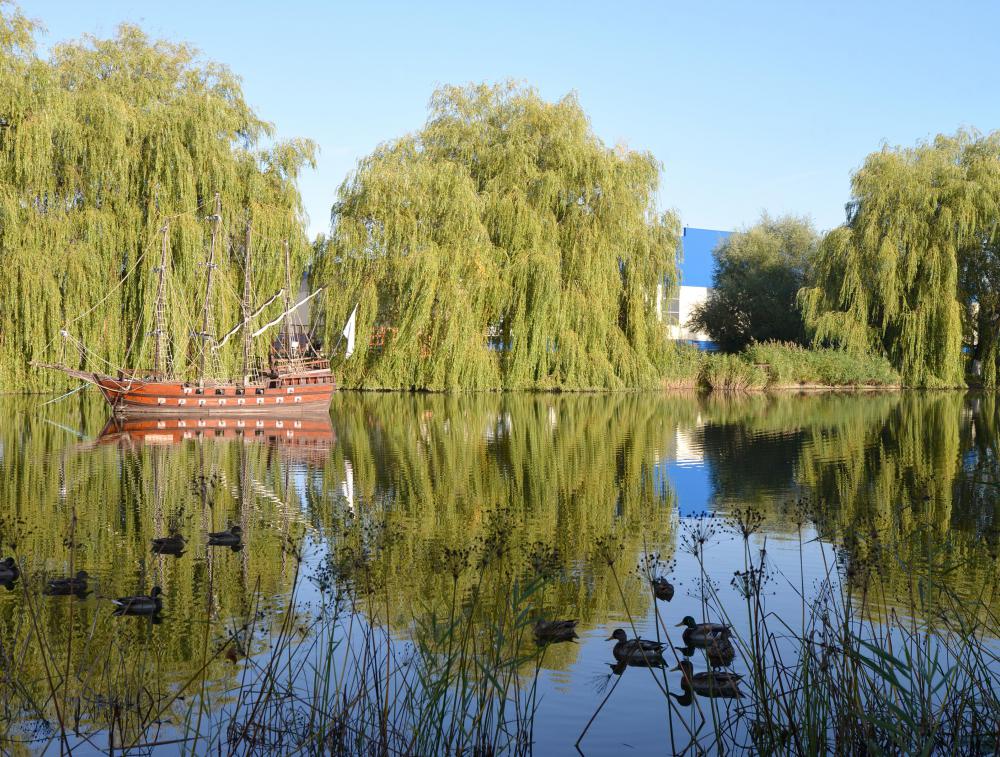At WiseGEEK, we're committed to delivering accurate, trustworthy information. Our expert-authored content is rigorously fact-checked and sourced from credible authorities. Discover how we uphold the highest standards in providing you with reliable knowledge.
What is Willow Water?
Willow water is water in which willow cuttings have been steeped, producing a liquid that is said to encourage rooting. Bonsai enthusiasts use it in particular. Willow waters were originally used as a rooting stimulant when commercially viable rooting hormone powders were not available.
Willow water root stimulant was probably first used by Native Americans. They were well aware of some of the properties of this tree, as they used to chew willow bark to relieve toothaches. Willow bark contains a substance called salicin, or salicylic acid, which is related to the painkiller aspirin. The Native Americans discovered that it is possible to grow a new willow tree simply by taking a branch from an existing tree and putting it in wet soil. This led to the further discovery that water in which pieces of willow branches and twigs had been sitting, when used to water other plants, could encourage rooting.

The science behind willow water root growth is attributed mainly to indolebutyric acid (IBA). This substance is a plant hormone that stimulates root growth. Synthetic forms of this hormone are used in many commercial rooting powders and preparations. IBA is present in high concentrations in the growing tips of willow branches. Selecting the actively growing portions of a willow branch, cutting them, and soaking them in water will result in significant quantities of IBA leaching out into the water.

The salicylic acid that, along with IBA, leaches into the water when willow water is made may also have a beneficial effect on the propagation of cuttings. One of the biggest threats to newly propagated cuttings is infection by bacteria and fungi. Salicylic acid helps plants to fight off infection, and can thus give cuttings a better chance of survival. Plants, when attacked by infectious agents, often do not produce salicylic acid quickly enough to defend themselves, so providing the acid in water can be particularly beneficial.

Willow water can be made from cuttings of any tree or shrub of the willow family, a group of plants with the scientific name of Salix. The more cuttings that are used and the longer they are soaked in water, the stronger will be the resulting willow water. Recommendations for the exact method of soaking vary. Cold water can be used, and soaking times of four or more weeks are often quoted. Other gardeners use boiling water to steep the willow twigs and soak the mixture for around 24 hours.
AS FEATURED ON:
AS FEATURED ON:
















Discussion Comments
@bythewell - I'm not sure they completely understand why the willow water works, or even why the acne treatments work, although you're right to say that the cells in question are very different.
This has made me realize why willows are such a pest in some areas. They tend to grow too thickly around waterways and clog them up, affecting both the natural environment and also the humans who are using the waterway for whatever reason.
They must spread really quickly if a single branch can grow a whole new willow tree without any problems.
They'd be difficult to get rid of permanently as well, since if you missed any branches they would quickly grow into a new set of problems.
I will have to remember the trick of using willow water as a rooting solution though.
I've never heard of salicylic acid being used for anything other than an acne treatment and occasionally as a dandruff treatment.
It seems to be the active ingredient in almost every acne cleanser I've ever used. I had no idea that it was related to aspirin, or the willow tree. It makes me wonder if it is somehow related, since I think the point of the acid in acne treatment is to get the cells to turn over more quickly, so that they don't clog up the pores. And the point of willow water seems to be to get the root cells to be more active as well.
But, mammal cells and plant cells are radically different, so it's probably a different mechanism on each one.
studies suggest IBA is not soluble in water. this would mean that none of the hormone would leach out. --jason
Post your comments